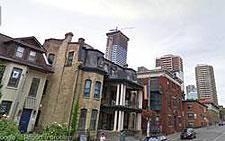The future of bars and restaurants in Toronto could be radically altered, thanks to a number of bylaw amendments passed at city council’s last session of the summer.
While laws governing drive-through fast-food restaurants got the bulk of the attention, the new rules will have a big impact on urban, downtown living.
Among the changes are restrictions on bars and restaurants south of Bloor St in the downtown core: outright bans on new back and rooftop patios and a ban on restos other than those on the first floors of buildings.
Those wanting to break the rules will need to secure an exemption, meaning that city councillors will be able to yay or nay many projects on a case-by-case basis.
In parts of the city where neighbourhoods are in flux — such as the Church-Wellesley Village — the stakes are higher, and, inevitably, it’s become an election issue, with all the candidates eager to weigh in.
Kristyn Wong-Tam calls it “one of the most important issues in Ward 27.”
“With respect to whether small businesses should be allowed to open bars and lounges, absolutely. It might not be a very popular decision with some of the local residents, but I don’t believe in stopping entrepreneurs. They have to abide by guidelines, and those guidelines already exist.”
Both Wong-Tam and fellow candidate Ken Chan appear to be bucking the anti-bar mentality of some incumbent city councillors.
“I would like to see more patio spaces here,” says Chan. He adds, “I think our alcohol laws are archaic. We should challenge the province to look at our liquor licence laws.”
Candidate Susan Gapka says the city must find “the right mix” in responding to partiers and other residents.
“I live right across from The Barn. I live in an area where there is a lot of night activity,” says Gapka. “You know what our biggest complaint is over there, other than the big tower going up at Yonge and Gerrard? The noise, at 2am on a weeknight, coming out of The Barn. People want to have fun, but it’s 2am and it’s a residential neighbourhood, too.”
“But,” she adds, “if noise is the biggest concern, it’s not a bad problem to have.”
Chris Tindal, another Ward 27 candidate, says Church St is an example of where that balance has already been struck.
“One of the things that works really well about Church St is that it has a good mixture of day life and nightlife. With some challenges, it’s a relatively successful mix of people who live there, who work there, who eat dinner there and go clubbing later on,” says Tindal.
Wong-Tam says Church St needs a comprehensive avenue study to look at existing building stock and businesses and to find out what kinds of businesses the community wants in the neighbourhood. She supports “people-led planning” that puts community consultation at the beginning of the process.
That’s an idea that resonates with Enza Anderson, another ward candidate. She says the city’s habit of asking for public input too late in the process is her “greatest pet peeve.”
“The way development is being handled at city hall is that they’re not informing the community. Before anything gets designed, before anything gets laid out, people need to be consulted,” she says.
With the proposed condo development at the corner of Church and Gloucester streets looming after the election, Tindal calls it “a litmus test” of the city’s development policy. All the candidates agree that the city should have consulted residents on that project earlier.
With a host of other development issues on the table — from Gapka’s emphasis on mixed-income spaces to Chan’s plans for façade improvement along the commercial strip — it’s a topic that’s likely to dominate discussions on the campaign trail.
Wong-Tam has even challenged the other candidates to debate the issue more fully.
“In Ward 27, we should have a debate just on development,” she says.
Toronto goes to the polls on Oct 25.


 Why you can trust Xtra
Why you can trust Xtra


